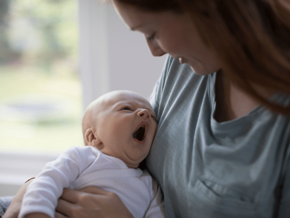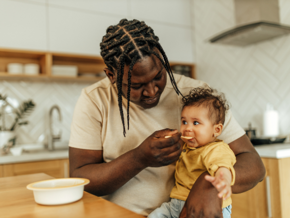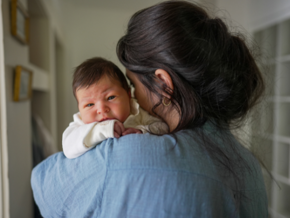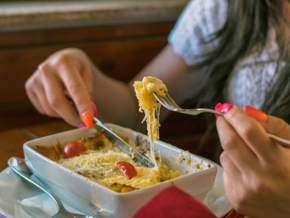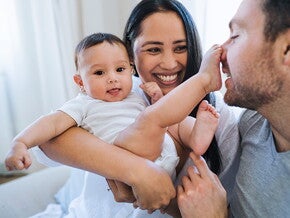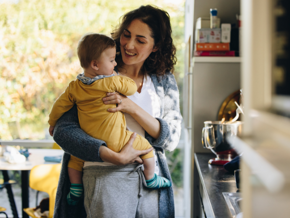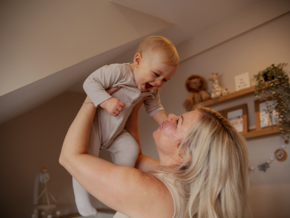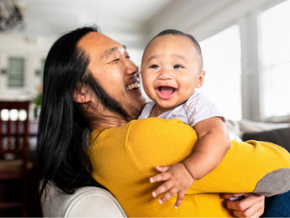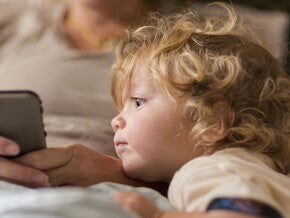
Keeping Baby Safe
Imagine the excitement of watching your baby get active. But the more active they become, the higher the chances of injury. Take measures to keep your baby safe.
The inquisitive drive to discover new things is to be encouraged, but take measures to prevent your baby from getting seriously injured. The lists below are by no means exhaustive. You can do a hundred other things to make sure your baby is safe but don’t panic and take away from the fun and enjoyment of parenting!
Top General Safety Tips:
- Chances of injury increase with age: The older your baby the more active and mobile. Crawling, standing, walking, running and interacting with the environment can be hazardous.
- The role of parents in injury prevention: Strategies to prevent your baby sustaining injuries continuously evolve as your baby grows and becomes independent and mobile. Be one step ahead and make the home environment safe.
- A safe home equals a safe baby. Injuries occur where your baby plays the most – at home. It is very important that you know and understand your responsibility in making your home safe.
- First aid. It is important not to panic in a situation when your baby gets hurt and be clear on first aid procedures. Attaining a First Aid Certificate and having emergency numbers within easy access will help you feel more confident;
- Never leave baby unattended. Always stay with your baby especially if on a raised or high surface such as a change table or high chair. Your baby has poor balance and can topple off or roll over at any time;
- Switch off house-hold appliances when not in use. Remember to switch off your house-hold appliances once you are done using them. Store them away safe from your baby’s reach. With larger appliances such as refrigerators and washing machines, make sure that the doors are closed or locked at all times;
- Cover furniture edges. If you have furniture with sharp edges, make sure they are covered with child-safe and child-proof covers;
- Ensure a safe playing area. Make sure play areas are absolutely free of any kind of glass, rusty or sharp objects which can cause injury.
Ways in which your baby can get hurt and tips to prevent it happening:
1. Falling:
Many babies get hurt from falling. It’s perfectly alright to have minor falls while crawling, learning to walk or run. That is part of the learning process. It’s not necessary to run and attend to your baby every time. Give your baby the chance to pick themself up and get going alone. Too much attention and help does not aid their development of independence and resilience. You will know, most likely from your baby’s cry, and the dreaded pause, when it’s a bad enough fall to attend to straight away.
Tips to avoid falling:
- Don’t let your baby stand on a chair. It’s never safe to make your baby stand on a chair. It’s very easy to lose balance and fall;
- Keep stairs closed off. Install safety secure latches or gates at the top and bottom of the stairs. Your baby is strong and can push them over so it is best to have them secured at the walls;
- Choose a safe place to change nappy. Change your baby’s nappy on the floor, they can’t fall off. If you change on a change table, keep everything you need within easy reach – that way you won’t need to leave your baby unattended to get things;
- Keep your home child-safe. You don’t want your baby to figure out ways to climb up to a window or the railing of a balcony. Keep doors locked that go outside. When your baby is older and allowed to play on the balcony, never leave them unsupervised if the play area is elevated;
- Choose safe footwear. The wearing of proper shoes is not needed until your baby is going for walks outdoors. Until your baby can walk well, closed-in shoes with a flexible sole are great for little feet that are still mastering the skill of walking. Thongs are not recommended for small developing feet;
- Prevent too much running. Discourage running in the house – keep running for outside where there is lots of space;
- Strap your baby in. Always remember to strap your baby in a car seat or high chair while eating.
2. Suffocation and choking:
Your baby is very prone to the risks of choking and suffocation while eating or playing with small toys. While intense curiosity is exciting, it makes your baby liable to put anything and everything in the mouth and choking can be fatal so you need to be on the ball.
Tips to reduce the risk of choking:
- Keep your baby away from flexible plastics. Make sure the mattress and pillows used by your baby have no plastic coverings. Your baby could nibble plastic and choke. Store plastic containers, plastic bags and small plastic toys out of reach;
- Prevent using too much baby powder. When inhaled in large amounts it can cause suffocation. Keep it safely out of reach;
- Do not pin or tie dummies to your baby. Strings and ribbon ties can wrap around your baby’s neck and cause discomfort or if tight enough can be more serious;
- Use the correct size Cot mattress and sheets. Do not leave loose sheets in the cot once your baby is rolling around as they can get wrapped around your baby. Head, legs or arms can get stuck between the mattress and the side of the cot if the mattress is too small for the cot;
- Keep mobile phones out of reach: Babies always find mobile phones an attractive object to put in the mouth. Small pieces can dislodge so keep them away from your baby’s reach;
- Always watch them eat. Take care when you are giving your baby finger foods to snack on. Whole nuts, popcorn, hard lollies, raw apples, sausages and raw carrots are all potential chocking hazards. Ensure your baby sits while they eat, as they are more likely to choke while running around;
- Be careful with balloons. Balloons can get especially dangerous when deflated – goes straight in the mouth, so keep your baby in sight;
- Restrict access to open water. Never leave your baby alone around water such as bath tubs, splash pools and swimming pools. Keep bathroom doors shut and the toilet lid down. Avoid keeping water in buckets or containers without lids – empty water out;
- Keep floors clean: As soon as your baby begins to crawl and explore wider expanses, make sure that floors are clear of small objects lying around. Babies are extremely curious and will put things in their mouth – which can cause choking;
- Keep clothes and toys free of loose bits: Free your baby’s toys of small loose parts that can pull apart and be swallowed. Keep checking clothes for loose buttons and fasteners.
3. Contaminated food:
- Poisoning from foods contaminated with bacteria is extremely dangerous in infants and the consequences are more severe than in adults as their immune systems are still developing;
- Provide your baby with fresh food preparations and use leftovers from the fridge within 24 hours.
4. Chemical Poisoning:
Chemical poisoning can occur from toxic cleaning products and medications left within reach of your baby. Apart from keeping a close check on your baby’s movements at all times, the following tips may help prevent injury from chemicals:
- Lock up chemicals. All commercial products in your house like house-hold cleaners, medication, ointments and toiletries need to be kept safely out of your baby’s reach. Have cabinets fixed with childproof latches and keep all your household poisons safely locked away and up high if possible. Better still, buy toxic free cleaning fluids;
- Throw away old and expired products. Go through your cupboards and storage areas, if you find something that has passed it’s used by date, throw it away;
- Medicines are not lollies. While giving medication to your baby, avoid calling it a lolly. While you want them to be not afraid of medicines, you don’t want them thinking they are too safe. Too much of the wrong medication is extremely dangerous and can cause death;
- Label medicines. Ensure all chemical and medical products retain their correct labels. If your baby consumes something dangerous, you need to know exactly what it is to let the doctor know;
- Never store chemicals or cleaners in food containers. It can be mistaken for food or drink and ingested accidentally;
- Careful with disposal. Dispose of empty chemical or cleaner containers carefully. Rinse them out and discard in a place where they can’t be accessed by your inquisitive baby;
- Place insect and rodent poison away from sight. Keep insect and rodent poisons in places which cannot be accessed by your baby;
- Keep alcohol out of reach. Your baby loves to imitate adults. Keep alcohol locked securely away out of your baby’s reach;
- Use lead-free house paint. If you are getting your house painted, make sure the paint you use is lead-free. Even if old paint is being stripped off or sand-papered, make sure your baby is away from the premises. Exposure to paint dust or peeling paint can cause lead poisoning.
5. Scalds and burns:
Scalds and burns from hot water need to be attended to immediately. Your baby’s skin is very sensitive to the sun’s rays and very susceptible to burning; so take measures to protect them from the sun.
Tips to prevent scalds and burns:
- Sunscreen. While some sun is important for Vitamin D absorption, a safer time to take your baby into the sun is before 10am and after 3pm when the sun is weaker. Cover your baby’s arms and legs and provide a hat and other shade if you need to go out in the middle of the day. Infant sunscreens can be used sparingly. Test for allergic reactions on your baby’s inner arm a few days before you lather it over larger areas of the body;
- Check the car seat buckle. The sun heats up car seats, buckles and straps. Extreme heat can cause painful rashes on your baby and the buckle when fasted near delicate skin can burn;
- Keep your baby away from electrical appliances. Heat-inducing home appliances like stoves, bulbs, toasters, portable heaters, grills, irons and curling irons can give your baby nasty burns. Keep these out of reach;
- Do not leave hot beverages unattended. Hot liquids like coffee, tea, soup or milk can scald your baby’s delicate skin. Never carry your baby around while pouring or carrying a cup of hot liquid;
- Check the temperature of the bath water. Keep hot water taps tightly closed and check the water temperature before placing your baby in the water. Lower the thermostat temperature of the household hot water;
- Teach the meaning of the word “hot” and help them safely experience how hot feels so they will avoid it;
- Plug all electrical outlets. Tape extension cords together to prevent your baby from pulling them apart and use safety plugs or outlet caps on all unused electrical outlets at home to avoid electrical burns which can be fatal;
- Practice baby-safe cooking. Turn all pot handles away from the edge of the stove while cooking. If you have multiple burners, cook on the inner burners rather than burners on the outside;
- Do away with tablecloths. There’s no need for a tablecloth on the dining table when you have a baby around. Your baby is very likely to tug at it and if there is hot food on the table, it may tumble down;
- Keep away fire. Keep all matches and lighters out of reach. If there is a fireplace at home, make sure it is surrounded with a secure screen;
- For hot water burns, run the affected area under cold water and seek immediate medical help.
6. Car travel:
Always use a suitable car restraint for your baby and be aware that you may need to change seats as your baby gets bigger. Each state has its own legal requirements so stay up to date. Have the car seat fitted correctly and for children under six months the seat needs to be properly fastened and adjusted in accordance with Australian Standards and it needs to be a rearward-facing child restraint. For children between six months and four years a properly fastened and adjusted rearward-facing or forward-facing child restraint with harness that meets Australian Standards is approved.
Tips to minimise car travel accidents:
- Safety seats are a must. Seat your baby in their own age appropriate car seat at all times;
- Use safety harnesses, safety shields and seat belts. Always use the required safety harnesses or safety straps that come with the child safety seat. Also, make sure the seat belts or harnesses used are tight enough and correctly positioned;
- Never leave your baby in the stroller behind a parked car. You never know when the car may back out. Keep your baby’s stroller in sight at all times;
- No playing in the driveway. Don’t allow your baby to ever play in driveways unless cars are removed and you are constantly supervising.
Never leave your baby in the car. Always take your baby with you when you leave the car. Babies can over heat, dehydrate and die very quickly in an airless closed car.


